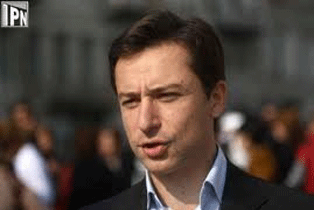Giorgi Targamadze: “Council of Europe Report Strictly Criticizes Situation in Georgia.”

interpressnews
The Criminal Code of Georgia, situation in the prisons, facts of violations of prisoners’ rights, the process of eviction of IDPs, abuse of power by the police authorities at the demonstrations, judiciary and media – these are the issues strictly criticized by the report of Council of Europe on the processes monitored in Georgia.
Leader of parliamentary minority of Georgia, Giorgi Targamadze from Christian-Democrat party, stated the corresponding to interpressnews from Strasbourg.
According to Targamadze, this document directly emphasizes that the Georgian Criminal Code is too strict and therefore, the prisons are overfilled, consequently, human rights are violated.
“There are recommendations that the courts should not pass disproportional and inadequate sentences on minor crimes and thus not contribute to hardening already severe situation in the prisons,” – he noted.
According to him, the resolution also talks about the situation regarding the violations of human rights; the process of eviction of IDPs is evaluated as the process violating European and international standards and Georgian legislation, and Council of Europe calls on Georgian government to improve the situation in this sphere.
According to the leader of parliamentary minority, the report also talks about the facts of use of disproportionate force and that the investigation on the violations by Georgian government revealed during 2007-2009 demonstrations have not been completed and the offenders have not been punished.
As Targamadze notes, the report also touches the situation in the Georgian media. Several steps taken by Georgian Parliament regarding the transparency of media owners are approved but it is indicated that it is not enough and thus it is essential that the government takes more adequate approach to the documents initiated in Parliament which envisage the accessibility of public information, easing the rule for issuing the TV space and other means which can ensure the media pluralism in the country.
According to the leader of Christian-Democrats, the document dedicates a significant chapter to the constitutional reforms which is positively evaluated. However, there is a direct remark that the constitutional reform needs to be more developed and the recommendations related to increasing accountability of government, very complicated procedure of declaring no-confidence and increasing the role of Parliament in the process of discussion of budget.
“As for the content of the document, it discussed the processes in Georgia developed since the year of 2008; the political system is evaluated; the hope that Council of Europe has towards the successful completion of negotiations on the election reform of Georgia is mentioned. It directly states that in order to overcome the confrontation, end the polarization among the political forces and reach the democratic consolidation of the society, it is essential to end the negotiations between the government and opposition with the compromise and consensus,” – states Targamadze.
However, according to him, the Council of Europe positively evaluates the political reforms undertaken in Georgia in sum. However, according to Targamadze there are recommendations that reflect more expectations in this sphere.
In the frameworks of the Parliamentary Assembly of Council of Europe, the discussions on the 40-page report have started today. The discussion is taking place in the Monitoring Committee; the resolution will be discussed tomorrow at the plenary session of the Parliamentary Assembly. The report includes five chapters – introduction, main political development, democratic institutions, supreme of law and human rights.



